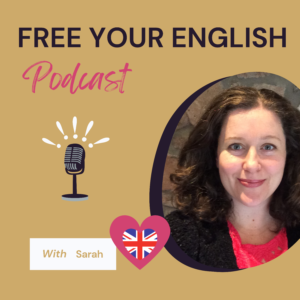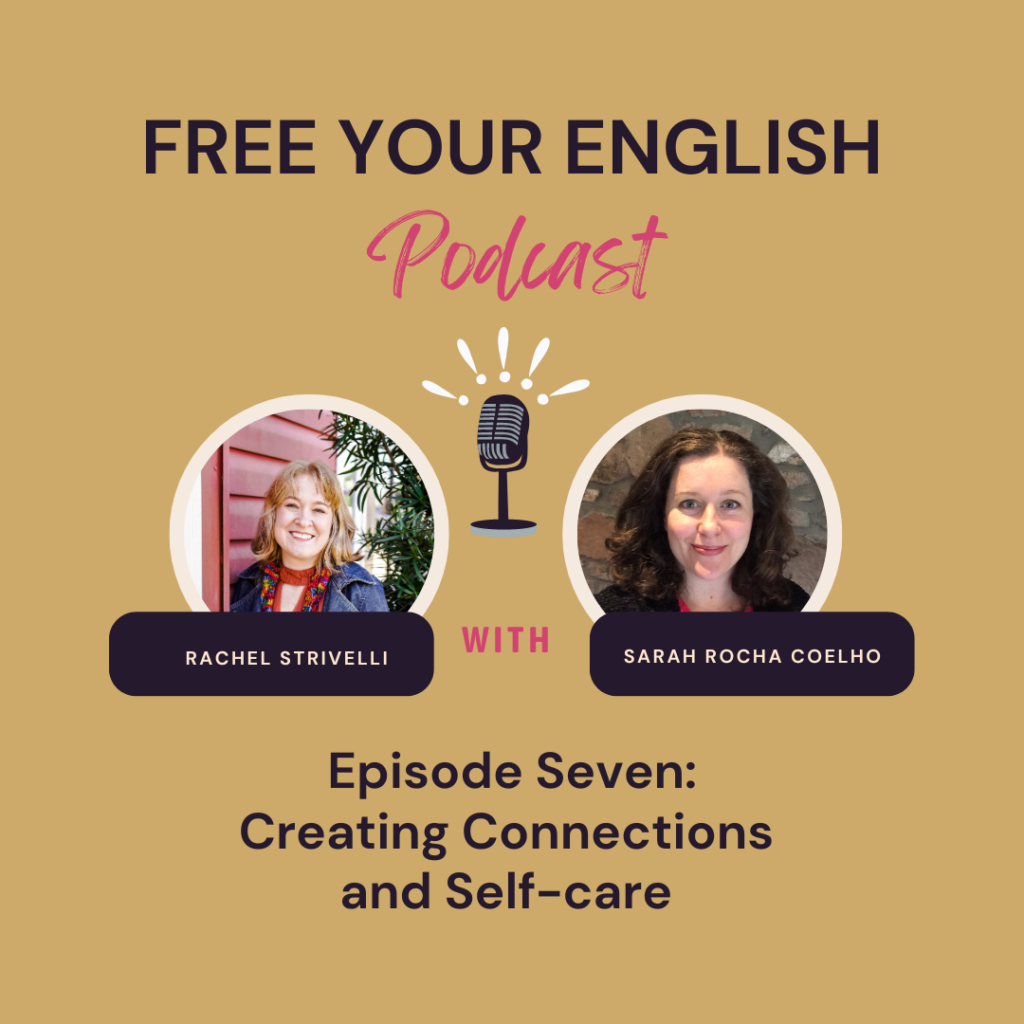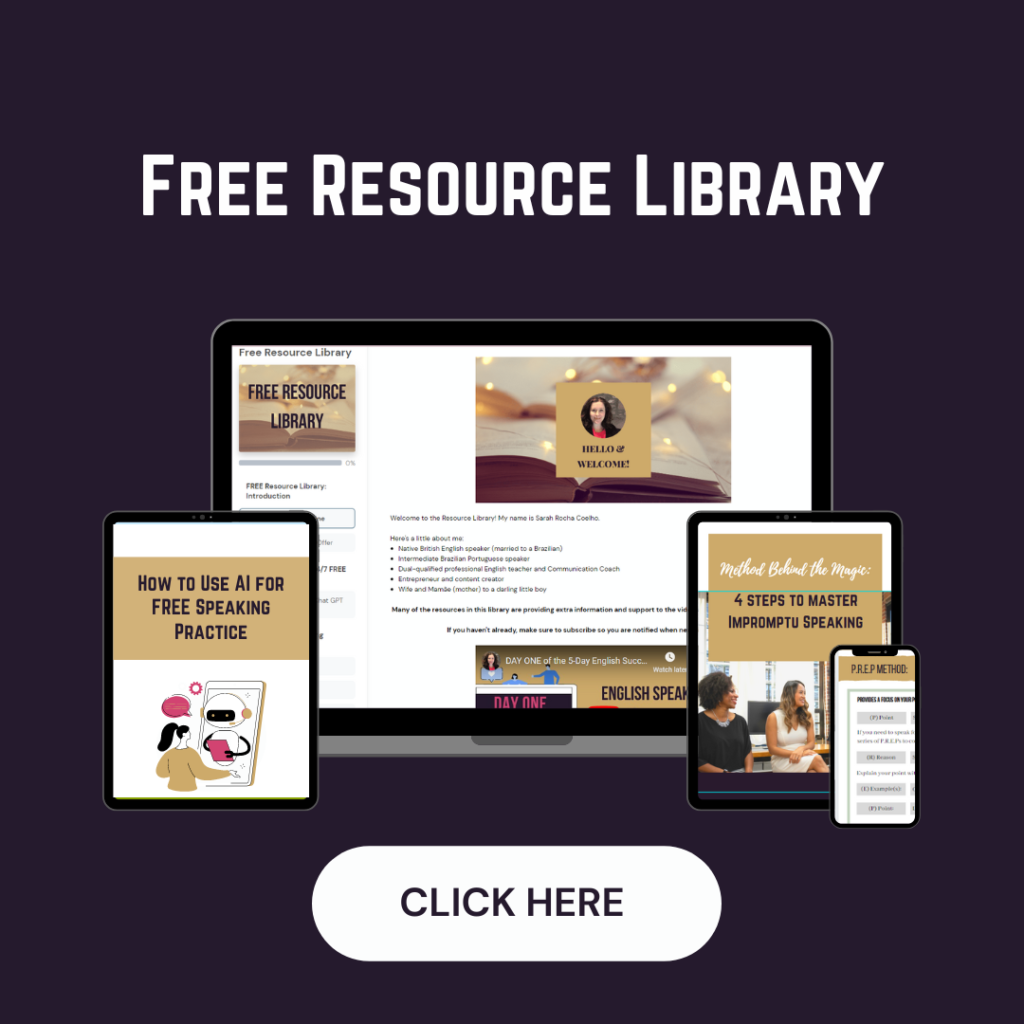This episode is part one of my interview with my first-ever guest, Rachel Strivelli, a psychic, intuitive mentor, and author of “Talk to the Trees.” Rachel and I discuss the importance of making connections and having good self-care for language learning. There is a listening and speaking task offered at the end. Don’t miss this engaging conversation!

Listen here on Spotify:
Watch this episode on YouTube:
Podcast transcript:
This week is part one of my first interview on the podcast. My guest and I talk about the importance of making connections and having good self-care for language learning. As we discuss both topics, the stories, and conversation offer advice that can help you with your English. At the end of the podcast, I’ll give you a listening and speaking task which will be to give a summary of the advice that was contained within our conversation. Also, I want to just give you a quick reminder that, as always, I have a transcript of this episode on my blog which is useful to use as you listen as we both have very different accents. The blog also has an overview of some of the vocabulary used, as well as links to Rachel’s work online. You can find that in the show notes if you are listening on your Podcast player or the video description if you are listening on YouTube. Okay, let’s dive in!
(Sarah):
Hello. Hello. Welcome to the Free Your English podcast.
I am delighted to say that we have our first-ever guest on this week’s episode. Rachel Strivelli is here. Rachel is a psychic, intuitive mentor, and author of “Talk to the Trees.” She helps overwhelmed spiritual entrepreneurs to gain clarity, feel grounded, and to take aligned action. A former school teacher and organic garden educator, she supports the growth and creative expression of all.
00:35
And I just read her book and it’s amazing. It’s been a really good read. So welcome Rachel. It’s a pleasure to have you here.
(Rachel):
Thank you Sarah.
(Sarah):
I wanted to start with a question about how we met. We’re gonna get into the work you do and your book but can you tell the listeners how we met?
(Rachel):
Yes. Although if I forget anything, you’ve got to fill in the gaps.
01:00
So, it has been several years. I feel that it’s been at least three but maybe even more. And to the best of my memory, we met in a Facebook group and I know – so – even though I’m a psychic now, when I first was in business… well, first I started out as an organic garden coach because I had a lot of experience in that and I knew what I was doing so I was coaching people in that and over time I thought: “I want to shift to life coaching and I want to work with people in that way.”
And so self-love and self-care has always been a big part of what I wanna to do for myself and I know we connected, I believe it was around self-love or self-care in one of the Facebook groups. And then it seemed that we had so many other things in common too that we connected and… I’m probably leaving out details. Are there details that you can think of?
02:02
(Sarah):
I think that’s the massive… that’s the gist of it for sure. It was about so many threads of, of you know, shared interests. And I wanted to start with this because I say this to people all the time – that they need to join Facebook groups where native speakers hang out and that it is possible to make amazing friendships from connections that you make online. And so, I wanted to kind of throw that out there and say this is evidence it’s possible. You can meet amazing people!
02:32
(Rachel):
Yes, and can I add onto this too. So in addition to Facebook groups, I’m in a group that is… it’s with a YouTuber because I have a YouTube channel so I’m growing that. There are a lot of people in this YouTube programme that I’m in – this mentoring programme – … they’re from all over the world and in that group the instructor has a Discord where we can communicate so… Discord is… I don’t really know how to describe it but there are rooms similar in a way to Facebook. And so through that group, I have connected to people who live in Europe. I live in the United States. There’s a few folks who are in that group who live in Canada and any – even though some of the people in the group have different levels of English, everyone in that group is really open to “we’re all in this together” and so when you have something that you have in common with people, even if English is your second language, the people who share that commonality with you wanna make that connection and want to speak to you and connect to you.
And I agree it’s so amazing how you can connect to someone from anywhere practically and.. and then there’s a woman in Spain I met in that group and we are connected on Facebook and Instagram and over email. She has a podcast she invited me to be on and I’ve never met her in person. I would love to go visit her in Spain one day! But we made that connection and just decided we have a lot in common, let’s build upon this. Let’s keep this going.
04:16
(Sarah):
Yeah. That’s that’s such a great point that these, you know, shared interests make it so that people want to communicate with you and that’s where you wanna be hanging out – where it’s really natural and people are really wanting that… that communication and that connection. Yeah. And I know that it was about self-love and self-care that we, you know, primarily connected. And I believe that’s still a thread of your work and it’s kind of gone through the iterations of the type of work that you do but can you tell us a little bit about the work that you do at the moment?
04:52
(Rachel):
Yes. Yes. So I work with people one to one or sometimes in small groups and I believe self-love and self-care is always at the heart of it because – let’s say you have a goal – well, a lot of you have a goal to have better English, okay, so we’ll just start with that. It’s hard to … to stretch and be comfortable with making mistakes if you aren’t practicing self-love, if you aren’t practicing self-care because with learning a new language or learning a new skill there’s always gonna be moments when you’re making a mistake – when it doesn’t turn out right. And if you don’t have self-love, it’s easy to get stuck in the mistake or think, “Well I messed that up, okay, I’m not going to try anymore.” And yet, self-love can be that sustaining thing where you have compassion for yourself and you say, “Okay, I messed up. That phrase I said or that thing that I wanted to do or I messed up and I missed a workout – even though it’s really important for me to get my workouts in every day…” If you love yourself even through the mistakes, it allows you to keep on going, to keep on making that forward progress.
And I think that’s what I’ve found with all the people that I support – that I work with one on one or in small groups – that when you can return to self-love… and sometimes self-love means like the self-care part of it where maybe you need more sleep or maybe you need to say “no” to a few more things in your life because growing and transforming and learning a new skill – it takes energy. Your brain is making all these new connections so you’re naturally gonna be more tired and so having self-care to say, “Maybe I’ll go to bed earlier this week” or say “no” to somethings – not take on as many commitments so that I have time to adjust and adapt because any type of growth or change that you wanna make – you also need to let yourself adapt, expand, adjust to that circumstance.
07:18
(Sarah):
Yeah, no, I couldn’t agree more – and you got right to the heart of it with talking about mistakes. That’s a big thing that holds people back from kind of getting to the next level of fluency is almost like as if people believe that the more they can catch and be critical and you know kind of self-monitor… but this idea of really listening to yourself and being in tune with what you need and what don’t need… I love that you mention that… like: what do you need to say a big “no” to? Yeah.
07:50
(Rachel):
Right!
(Sarah):
Absolutely!
(Rachel):
Yes and I want… I have a small story to share. So last week I was at a lunch with people from all over the world. There’s a local group to me which is an international group. And there were two women there sitting near me, sitting side by side who were both Spanish speakers and I told them I was learning Spanish so one of them asked me why. She asked me in English. And I tried to say, “Spanish is a beautiful language. I wanna meet more people.” I know I did not say “I wanna meet more people” correctly. I know I said “Spanish is a beautiful language” good enough that they kinda got what I meant. But it was funny because even as I was speaking, I’m thinking, “Oh they’re… This… I’m making a mess of this sentence… trying to speak in Spanish!”
And one of the people I think was kind a like, “Okay, I don’t know if I wanna go there in this conversation” And she turns and starts talking to the other person on the other side of her. But the other woman was so encouraging. She was nodding her head. She was smiling and I… I felt that connection of … she was glad that I was at least making the effort and we both knew that I wasn’t doing the best job but that was okay and again it wasn’t the type of setting where she was gonna correct me but I was proud of myself for at least trying on the spot to say something to connect and… and … knowing that even… even… with making some mistakes I thought, “Well, one, I might go back and actually find how to say what I wanna say so that next time someone asks me I can reply in Spanish why I’m learning Spanish and two it just made me think I’m glad I tried” because I thought I was getting better at the language just learning it on apps but then when I tried to speak or even listen to real time conversations, I realised I’m not making the type of progress that I actually think I am.
09:58
(Sarah):
Yeah. You have to be out there and doing it to… to… to really feel what that’s like and… and to make progress and that’s amazing that you were proud of yourself – quite rightly – ‘cos that’s where the progress comes is just letting yourself speak and make mistakes and be okay with it and focusing on the message and the connection and you know of course being who you are and how you work you automatically did that, right. The message that I’m trying to say – the connection that I’m making – is important enough that I’m willing to make the mistakes – so I love that story!
Okay, now that you’ve listened to the part of our interview that I am using for this week’s episode, I encourage you to pause this and to speak out loud a summary of what you have heard. Try to state what were the biggest takeaways (i.e. helpful advice).
Have you done it? Have you paused?
Here’s a model answer:
Rachel and I discussed the importance of making connections and having good self-care for language learning. We discussed how we started our friendship when we met through a Facebook group. A big takeaway from this episode is that you should join Facebook groups and other online groups online that are not about English but about a subject you are passionate about. It is more likely you will be able to make friendships with native speakers who genuinely want to connect with you. We also discussed self-love and self-care, which is a big piece of Rachel’s work. Rachel mentions that you need to have self-compassion so that you do not give up when you go through the normal process of making mistakes as you speak.
Thanks so much for listening. Please do hit subscribe and like if you are listening on YouTube or consider writing a great review if you are listening on a Podcast player. Come say “hi” on Facebook or Instagram and please do join us for the next episode as Rachel and I continue our conversation.
Connect:
You can connect with Rachel and find more of her content and work here:
YouTube: https://www.youtube.com/RachelStrivelli
LinkedIn: https://www.linkedin.com/in/rachelstrivelli/
IG: https://www.instagram.com/rachelstrivelli/
Tiktok: https://www.tiktok.com/
Vocabulary overview:
To throw something out there (phrasal verb) = to suggest or propose something, (often without much thought or preparation.)
“… they need to join Facebook groups where native speakers hang out… it is possible to make amazing friendships from connections that you make online. And so, I wanted to kind of throw that out there.“
E.g. I’ll just throw this out there: have you considered applying for a promoted position? You have the skills!
We’re all in this together (phrase) = this phrase is used to signify that there is a shared belief that everyone is experiencing the same difficult situation and it’s therefore important to work together. It’s often used to encourage solidarity and cooperation.
“… even though some of the people in the group have different levels of English, everyone in that group is really open to “we’re all in this together.”
E.g. The manager gave a talk to his team about how they were all in this together and they should each support each other through the project.
Thread (noun) = in this context it means a “thread of something” which is something continuous or connected.
“And I believe that’s still a thread of your work and it’s kind of gone through the iterations of the type of work that you do.”
E.g. A common thread through the movie was that the main character was a really bad guy.
Iteration (noun) = the process of repeating a series of actions or steps to make something better. In the context of career iterations, it means changing and improving what you do.
“And I believe that’s still a thread of your work and it’s kind of gone through the iterations of the type of work that you do.”
E.g. As a painter, I often make small changes to my artwork in the final stages. With each iteration, I can see how it is getting closer to the final product.
To get to the heart of something (idiom) = to reach the central or most important part of a matter, issue, or problem.
“… and you got right to the heart of it with talking about mistakes.”
E.g. It took the plumber a while to get to the heart of the issue but eventually, he found the leaking tap.
Your next steps:
Make sure to access my FREE Resource Library to take action towards gaining the confidence and clarity in English that you desire.
It includes: instructions on how to use AI for free speaking practice, worksheets, interactive quizzes and more!
Click the image below:

